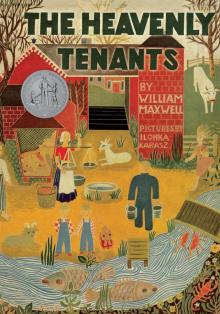- Home
- William Maxwell
They Came Like Swallows Page 5
They Came Like Swallows Read online
Page 5
“Why does your mother have to go any place? Why can’t she stay right there while they are away? They could get some one to come in nights so that she wouldn’t be alone.”
“They’re going to close the house up. The gas and electricity will be turned off.”
“For five days?”
“Yes.”
Bunny thought of Aunt Clara’s house, standing there on the other side of town. And how Grandmother Morison and he went up the narrow stairs that lay behind a door in the Spare Room. Up to the attic which was Unknown Land, full of boxes he was not encouraged to look into, pictures, vases, trunks, broken pieces of furniture, magazines, books, old clothes—so much of everything and so many things that he could never get more than a confused geographical impression of the whole. By the double flue were toys that had belonged to Cousin Morison when he was a little boy. These he was not allowed to touch…. By the second dormer window was another collection, which belonged to Robert. Not so many, of course. Few of Robert’s toys survived the treatment he gave them. Bunny was not allowed to touch these, either…. In the far corner of the attic beside the water-tank were his own toys, all carefully put away in an egg-basket. These he could take down with him to Grandmother Morison’s room, which smelled of camphor.
While she made quilting patterns out of brown tissue-paper, he played with the lovely Russian sleigh that worked on spools. With the paperweight Lion of Lucerne. With tables and chairs for the house where the three bears lived. And there were pictures in the basket, as well as toys. Pictures of Daniel, of Ezekiel in the valley, of Joshua with his sword drawn, bidding the sun and the moon stand still.
Bunny could not help regretting those other toys at Aunt Clara’s which he was never allowed to play with. Especially the little gold piano with angels painted on it. Once, as he was going by, he put out his hand and touched one of the keys. And Aunt Clara called up to him through the floor that the little piano was Cousin Morison’s (who died of typhoid fever) and he was not to touch it.
“I’m telling you what Clara said.”
Bunny moved closer to the doorway. If he went any farther they’d stop talking, but at his back was the dark pantry, and the door into the kitchen was wide open.
“If it were at any other time. But we’ll both be gone, and you know there’s no telling what she may take into her head to do. I don’t really mind her straightening my dresser drawers—I do mind, as a matter of fact—but she feeds Bunny gumdrops and horehound candy until his stomach is upset, and tells Sophie she won’t go to Heaven because she was baptized in the Lutheran Church…. And what about Irene? Shall I tell her that we’ve changed our minds and don’t want her to stay with the boys while we’re away?”
“No, I’d rather she were here.”
“So would I. Much rather. But the house isn’t big enough to hold Irene and your—”
Bunny’s question was decided for him by a disturbance on the back stairs—so sudden that his terrified heart nearly stopped beating. With arms outstretched he threw himself bodily upon the lighted room.
10
While Bunny waited, the cymbal in his left hand and the large padded drumstick in his right, Robert beside him tapped delicately on the edge of his chair. Light shone on the varnished surface of the piano, on the ivory keys. His father’s hands proceeded up the keyboard in a series of chords twice repeated. Across the living-room his mother was looking at them. She was waiting for them to begin. “Well, gentlemen?”
Bunny met his mother’s eyes at the precise moment when his father started forth upon the opening measures of Stars and Stripes Forever. The flood of sound was so sudden and so immense that Bunny came near drowning in it. He caught at the regular six-eight rhythm as if it were a spar, and striking out with the cymbal in his left hand, the drumstick in his right, he tried frantically to save himself.
Ching …
Boom …
Ching …
Boom …
Boom …
Boom …
Boomdiddy-boom-boom …
Once started, the music swept along of its own momentum, carrying Bunny with it. He was helpless. So was Robert and so was his mother. The only opposition came from the room itself. What the green walls threw back, the fire caught at and sent up the chimney. What the fire could not reach, the ringed candelabrum turned nervously into light, ring upon ring.
After Stars and Stripes Forever came Washington Post and El Capitan and The Fairest of the Fair. Bunny’s eyelids began to grow heavy. They were weighed down with music. He told himself anxiously that he must keep them open. He must not drop off to sleep. But in a very short while there was Karl’s great-grandfather digging and digging with a pipe in his mouth …
digging …
and the water seeping into his ditch …
and the air grown darker …
and the high wind …
“Now what’s wrong?”
The music had stopped and Bunny saw to his amazement that he was at home, in the living-room. And his father was frowning at him.
“He was falling asleep,” Robert said.
“You can’t expect to play with us, son, if you’re going to fall asleep every five minutes. See if you can’t do a little better.”
Bunny stared self-consciously in front of him, past Robert’s grave smirk.
His father turned back to the piano and with his left hand struck a chord, then another. “We’ll quit in a few minutes and then you can go to bed.” They took up The U.S. Field Artillery where they had left off. Bunny forced his eyelids so wide apart that they ached. If his mother would only look at him! Through the fading light he saw that she was reading. She had picked up a magazine. His eyelids closed for a second and when he opened them the room had darkened permanently. There was nothing, he found, that he could do about it. He heard the rhythm of the piano. Cymbal chinked blindly on cymbal and drumstick beat drum. But he was wrapped comfortably around in music so deep and so firm that he could lie back upon it. He was upheld for a long time and then moved forward into a darkened air where thunder burst concentrically out of red rings … green rings … lavender rings …
“For the love of God!”
“I wasn’t falling asleep!” Bunny said, so wide awake now that he thought he was telling the truth. “Oh balls!”
What this word meant when it didn’t mean a ball that you throw or bounce, Bunny had no idea, but he knew it wasn’t nice, whatever it was. And imprisoned inside him was another little boy who was nobody’s angel child and who didn’t like to be shouted at. That little boy said, “Balls your ownself!”
By the loud silence that had come over the room, Bunny realized that he’d gone too far. He looked at his mother, and then at Robert, who avoided meeting his eyes.
His father said sternly, “Go to bed, son. Go right now.”
Bunny went over to the sofa, and as he bent down to kiss his mother good-night, his eyes searched her face for the indignation he was sure she felt, and he got a terrible shock: She was trying to keep from smiling.
She was not indignant with his father, she was on his father’s side.
It was all that he could do to get up the stairs.
11
Bunny woke early to the sound of church bells, though it was Monday morning. Could it be Sunday all over again? Or was there something tremendously the matter?
While he lay in bed, wondering, the sky was split wide open by the whistle from the shoe-factory; by a second whistle from the waterworks. Then the fire alarm began, absorbing whistles and bells into its own dreadful moaning. Until sound became general and the morning throbbed with it.
When Bunny drew his head out from under his pillow Robert was gone, his bed disturbed and empty. One last turn and Bunny got up likewise. Washed himself, dressed, and went downstairs. At the door of the library he waited, uncertain how he might be received. Robert and his mother were eating breakfast before the fire. His father was sitting in the window seat, reading the Chicago Tribune
. His father’s coffee was there neglected on the window sill beside him. They looked so nice, sitting there. So like themselves. Was it possible, Bunny considered, that what he remembered about last night had never really happened?
“Good morning, everybody,” he said, politely.
All three of them spoke at once:
“The War’s over.”
“Oh.”
In his sleep he dreamed things that were quite real afterward. Could it have been that? Could he have dreamed that he talked back to his father and got sent up to bed? … He sat down in his place at the breakfast table and tied the napkin around his neck. Last night the music went on for a while without him, and then it stopped abruptly and Robert came upstairs. That much was true, not something he dreamed. And through the fringe of his eyelashes he had watched Robert undressing, taking down the straps of his wooden leg. Then darkness closed in around the sides of his bed and he was free to grieve. If she had been the one, he thought—if she had been in trouble, nothing in the world could have kept him from going to her. She did not really love him … Tears came, hot and effortless. Ran down his cheeks into the pillow, until he was exhausted and lay quiet, looking at the wedge of light under the bedroom door. After a time it grew wider. He heard them talking downstairs, and then the legs of the card table creak as they slid into place …
PEACE AT LAST
Bunny deciphered the headlines of the morning paper, upside down.
Germany Surrenders
Signs Armistice Terms
“Is that what all the noise is about?”
“Of course. What did you think?” Robert was almost unbearably superior.
“I didn’t know. I thought maybe it was a fire.”
“A fire! Listen to him. He didn’t even know the Armistice is signed!”
Bunny looked to his mother for enlightenment. The word ‘Armistice’ was new to him, and he felt reasonably certain that Robert didn’t know what it meant, any more than he did.
“It means King’s X,” she said.
“It means we beat the Germans,” Robert said. He got up from the table and a moment later they heard the front door slam. Robert had gone to join the excitement.
His mother drew him to her. “Haven’t you forgotten something?”
Hair? Teeth? Face and hands? He forgot to kiss her … In the night someone bent over him where he lay sleeping. Someone put Araminta Culpepper in his arms. She must have … Bunny saw that his father was waiting for their attention.
“You might listen to this, son. You might like to remember it when you’re grown.”
But instead of listening to the military terms of the armistice with Germany, Bunny went and put his head in his mother’s lap, for he felt very odd inside of him. He heard her say, “James, this child is burning up with fever!” and he thought dreamily that it must be so. I’m going to be sick, he thought, grateful for the cool hand on his forehead and her nearness. And after that, life was no longer uncertain or incomplete.
Book Two
ROBERT
1
The grass under their feet was trampled and flattened down unevenly. They were hoarse from shouting. They knelt with their hands braced, with their toes balancing. Between their legs they saw the unstable sky
Nine …
Sixteen …
Thirty-seven … and the roofs of houses.
Offside
Offside
Sixty-four …
Offside
Hunderd-and-eighteen-shift
Watch it now
All right
WATCH it
All right
WATCH IT
They ran with knees high and trees spinning. The grey light of evening touched their foreheads, their thin dirt-drawn cheeks, their hands. Crying words, crying names, they fell together—impact of back and shoulder, down, on unknown thighs and the hard ground.
It’s your turn to kick off
All right
It’s your turn
Three …
Seventeen …
Thirty-eight …
McCarty’s offside
Forty-seven …
Hang on to it
Hang on to it
Oh …
Do you stink, Northway
Into the clear circle of their voices Robert went, limping—McCarty’s voice. Northway’s voice, taut and protesting. The sky enclosed his shoulders.
Ah
Don’t kick it
No
Knock a guy out doing that
What
Fooling like that
Come on
Come on, Morison, pass it
PASS it
Robert was thrown to the ground, alive and breathing.
Touchdown
Listen, after this …
Touchdown
It’s not, either
For our side
Cryin’ out loud
Touchdown
When
Time out I said
When did you
When
Robert picked himself up off the ground and adjusted the knees of his knickerbockers. Not gradually but all at once it was getting dark. He drew his sweater on over his head, weaving argument into it, and denial. They were going home now. Matthews and Scully and Northway and Berryhill (with the ball between his knees) and Engle and McCarty.
So long, McCarty
See you tomorrow
So long
Whose cap is this
So long
Somebody lost his cap
See you tomorrow I said
And don’t forget
See you tomorrow
The sky hung down, dark and heavy upon the trees. Robert straddled his bicycle and with Irish between the handlebars left the field, riding now on the sidewalk and now in the street, which was old and full of unexpected hollows. The front wheel of his bicycle turned this way and that, jolting them,
“We should have had that touchdown,” Irish said.
“By rights we should have had it, but what can you expect?”
Though it was Robert’s bicycle, Matthews or McCarty or Berryhill would have offered to do the pedaling. They took it for granted that Robert wanted them to do the pedaling, on account of his leg. Irish never did. When it was time to go home he came and settled himself between the handle-bars.
After the third long block the car tracks ended and there was level pavement. Street-lights went on at all the intersections. And houses withdrew beyond the rim of the fierce swinging light. Robert, turning, saw the shadow of his head and shoulders lag behind, saw leaves scattering….
After the one-story house of old Miss Talmadge came the Bakers’ and the McIntyres’ and the Lloyds’, then the driveway at the side of Irish’s house, and the front walk. Irish got down.
“See you tomorrow.”
“Sure, and thank your mother for lunch.” “Sure,” Irish said.
There was a light in the kitchen window, but the rest of Irish’s house was dark and uninhabitable.
“So long,” Robert said.
Irish waited for some leaves to blow past.
“So long.”
Through one last street lamp Robert rode alone—the shadow of his wheels elongated, preceding him. Beyond Miss Brew’s and the Mitchells’ and the Koenigs’ (beyond the unseen, undreamed-of darkness) was home: the porch light and the front door, the white pillars along the front of the porch, and Old John waiting in the shadows to greet him.
“How are you, huh? How’s the boy?”
Old John wagged in a slow difficult circle, his head and hind quarters and the tip of his tail.
“How’s the boy, huh?”
Robert slanted his bicycle against the steps and then, opening the front door, passed into the circumscribed region of the front hall, Irene saw him at once, and started toward him.
“Look out, now.” Robert gave her fair warning. “You’ll get in trouble!”
If he pretended to go right a
nd went instead to the left, he could always get by his mother. But with Irene it was not so easy.
“Look out, your own self!”
He charged straight at her and was caught, before he could get away. She bent her face down, smothering him.
Standing in the door to the library, his father said, “It is vitally important to keep her out of that boy’s room. ‘Tie her down,’ Dr. Macgregor said, ‘if you can’t keep her out any other way.’”
Robert found suddenly that he was free.
He pulled off his cap and his outermost sweater. He would go now and stand beside his father, who did not subject him to these humiliating displays of affection. Irene knew he didn’t like to be kissed. She only did it for meanness…. Robert was confused. The noise of the playing-field was still in his ears, ringing. When he hitched up his knickerbockers, Irene did likewise with her skirt.
“Where’s Bunny?” he said, and made a face at her.
“He’s sick.” It was his father who answered him. “What’s the matter?”
“Spanish influenza,” his mother said, coming toward them from the dining-room. Robert turned his eyes away. She was getting big around the waist, on account of the baby coming. He didn’t mean to look, but sometimes he did, anyway, and it embarrassed her.
“If I’d only had sense enough,” she exclaimed—not to them but to herself, apparently. “If I’d only taken Bunny out of school when the epidemic first started!”
The room seemed very bright to Robert, after being out-of-doors. He could feel the heat from the fireplace through his clothes.
“You can’t be taking the boy out of school every time somebody in town gets sick.”
“Robert, your hands—” By the way that his mother spoke to him, it was plain that she had not been listening. She roused herself. “You can wash out in the kitchen. Run along now … I want to slip upstairs for a minute.”

 The Chateau
The Chateau Time Will Darken It Time Will Darken It
Time Will Darken It Time Will Darken It The Heavenly Tenants
The Heavenly Tenants They Came Like Swallows
They Came Like Swallows So Long, See You Tomorrow
So Long, See You Tomorrow The Folded Leaf
The Folded Leaf All the Days and Nights
All the Days and Nights Time Will Darken It
Time Will Darken It Ancestors
Ancestors